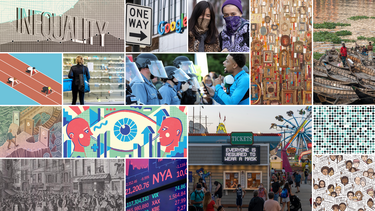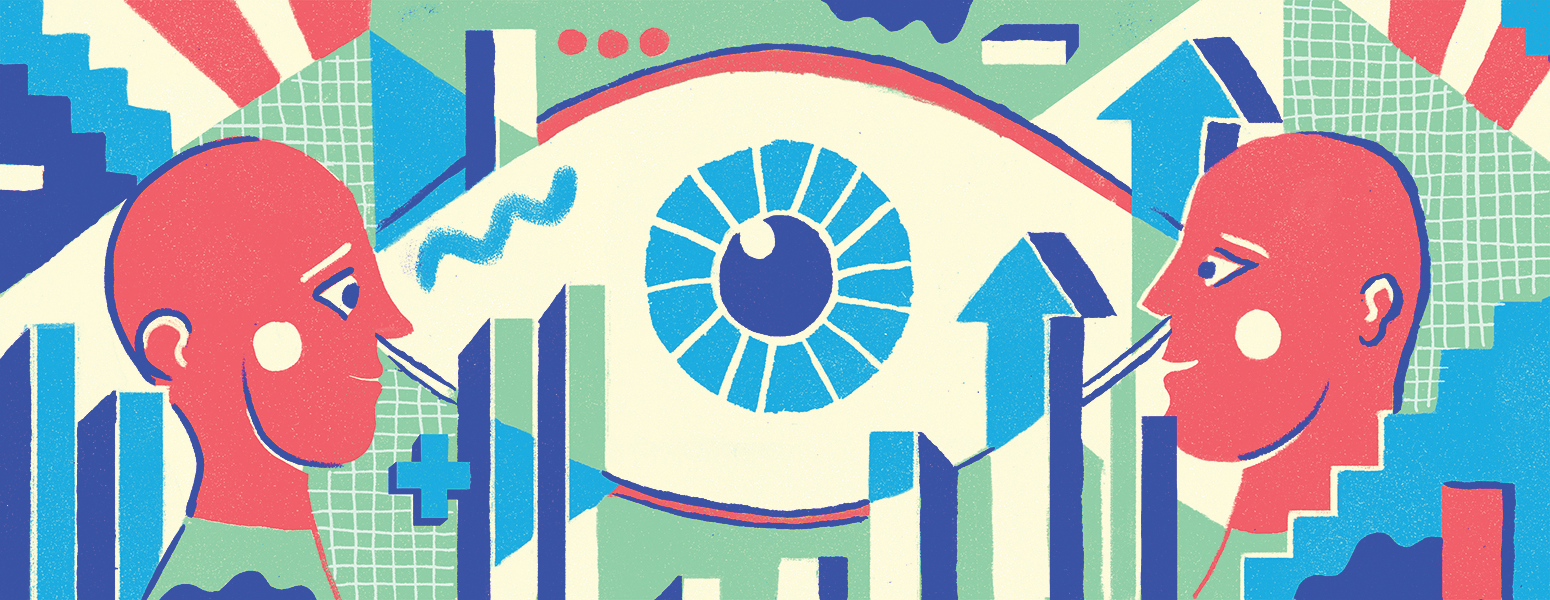Top Insights of 2020
This year, many of our most-read articles examined aspects of two monumental events shaping society: the COVID-19 pandemic and the resurgent Black Lives Matter movement. Others explored gender discrimination, financial history, behavioral research, and the interpersonal fallout from the 2020 election.

How Meritocracy Worsens Inequality—and Makes Even the Rich Miserable
January 9, 2020
In his book The Meritocracy Trap, Yale Law School’s Daniel Markovits argues that rather than democratizing American society, meritocracy has contributed to increasing inequality and the decline of the middle class. We asked him what it would take to create a society with opportunities for more Americans.
Single Women Get Lower Returns from Housing Investments
February 25, 2020
A new study from Yale SOM’s Kelly Shue and Paul Goldsmith-Pinkham finds that single women see significantly lower returns from buying and selling real estate than single men, losing out on an average of $1,600 per year. This inequity may help explain part of the overall gender gap in wealth accumulation.
What the Plunge in the Stock Market Means for Individual Investors
March 18, 2020
The S&P 500 has fallen by more than 30% as the markets react to the COVID-19 crisis. We asked Yale SOM’s James Choi, who has examined the implications of academic research for personal finance, what studies say about how to respond to a market crash.
Why a Pandemic Leads to Panic Buying
March 19, 2020
Many of us have faced empty shelves—especially in the toilet paper aisle—as we and millions of fellow citizens prepare for life in the age of COVID-19. We asked Yale SOM’s Nathan Novemsky, an expert in the psychology of judgment and decision-making, for his thoughts on how consumers are behaving during the pandemic and how they’re likely to view companies’ actions in the aftermath.
Video | Crashes and COVID-19 in Historical Context
March 23, 2020
The stock markets are reeling as fear and uncertainty about the global pandemic grow. We asked Yale SOM’s William Goetzmann, whose research includes financial history, to put the volatility into historical perspective.
Responding to COVID-19 in the Developing World
April 3, 2020
The mass social distancing strategy being used to mitigate the spread of COVID-19 in the United States and Europe doesn’t easily translate to a developing country like Bangladesh, which lacks the capacity to impose restrictions or provide a social safety net for the unemployed. We talked with Yale SOM development economist Mushfiq Mobarak about how he is repurposing his research infrastructure in Bangladesh to gather information and test approaches to spreading public health messages.
Time to Put on a Mask
April 5, 2020
A team of Yale researchers looked at the evidence for whether ordinary people should wear masks to slow transmission of COVID-19. Their verdict: Yes, we should all be wearing cloth masks, but give the surgical masks to healthcare workers. We asked Yale SOM’s Jason Abaluck and Judith Chevalier, two of the co-authors, to explain the reasoning behind this recommendation.
Leading through COVID: Manage Your Team with Empathy
April 20, 2020
In this series, we talk with Yale SOM alumni about their professional and personal lives during the global pandemic. Laszlo Bock ’99, founder and CEO of Humu and former head of People Operations at Google, says that right now, checking in on how your team members are doing is the most important thing you can to keep your organization productive.
Video | Narrative Economics: How Stories Go Viral
April 28, 2020
In his book Narrative Economics, the Nobel Prize-winning Yale economist Robert Shiller examines how the stories we tell about our lives and our society can spread from person to person, changing shared perceptions of events and shaping economic behavior. In a video recorded in November 2019, he explains the role of such narratives in events like the Great Depression and the global financial crisis of 2007–2009.
How White Managers Can Respond to Anti-Black Violence
June 1, 2020
Yale SOM’s Michael Kraus, a social psychologist whose research focuses on inequality, offers a series of concrete steps that leaders can take to combat racism in their own organizations—and contribute to the societal fight against injustice. Remaining silent, he says, communicates support for the status quo.
The Antitrust Case against Google
June 8, 2020
State and federal authorities are reportedly preparing to bring antitrust charges against Google, focusing on anti-competitive behavior in the company’s online advertising business. Yale SOM’s Fiona Scott Morton, former chief economist in the Antitrust Division of the U.S. Justice Department, recently co-authored a paper laying out a roadmap for potential action against the company, drawing on information released in an investigation in the UK. We talked to Scott Morton about Google’s role in online advertising and how it limits competition.
How to Start Making Real Change in Your Organization
June 11, 2020
We talked to Yale SOM leadership expert Heidi Brooks about how leaders should respond to structural inequality and racism. She says that many companies have a bias toward taking quick action that is ill-suited to a complex and ambiguous issue. Instead, organizations should reflect on their own culture and power dynamics and create a long-term plan for impact.
The Wealth Gap Facing Black Americans Is Vast—and Vastly Underestimated
July 15, 2020
For every $100 in wealth held by a White family, a Black family has just $10. But studies by Yale’s Jennifer Richeson and Michael Kraus show that Americans believe that the disparity is much smaller. They explain why the misperception is a huge hurdle to closing the gap.
In Estimating COVID-19 Infection Risk, Frequency of an Activity Is Key
July 27, 2020
With proper precautions, the risk of a day at work, a ride on the bus, or a workout at the gym may be acceptable, write Yale SOM’s Arthur J. Swersey and his co-authors. But that risk compounds dramatically when an activity is repeated day after day.
Choosing the Wrong Health Insurance Could Kill You
September 2, 2020
By examining what happens to outcomes when Medicare Advantage beneficiaries switch from one privately managed health insurance plan to another, Yale SOM’s Jason Abaluck and his co-authors calculated that the plans appreciably influence the survival rates of their enrollees. Shutting down the plans with the highest mortality rates could save thousands of lives per year.
Video | Holding Up a Mirror to the First Global Stock Bubble
September 3, 2020
Exactly 300 years ago, in 1720, Europe was seized by a mania for investing in the expanding trade in the New World; stock prices soared and then collapsed, in what is now recognized as the first global stock bubble. Yale SOM’s William Goetzmann, an expert in art and finance history, showed us the satirical prints that documented the financial cataclysm in the book Het Groote Tafereel der Dwaasheid (The Great Mirror of Folly).
A Passionate Startup Pitch Is Powerful—But Can Be Misleading
October 14, 2020
Entrepreneurs should be funded based on the strength of their ideas, right? In reality, according to a new study co-authored by Yale SOM’s Song Ma, those with cheerful and enthusiastic presentations are more likely to get venture capital funding—and less likely to build successful ventures.
Can We Talk about Politics at Work?
October 29, 2020
It’s a tense time in American politics, to say the least. We asked Heidi Brooks, who studies organizational behavior and pioneered the course Everyday Leadership, for her advice on how organizations can respond positively to strong opinions and emotions around political issues—both during election season and after the votes have been cast.
How to Keep Your Sense of Purpose While Working Remotely
November 6, 2020
Many of us have been working from home since March, with no end in sight. Yale SOM’s Amy Wrzesniewski, an expert in how people find meaning in their jobs, says that working remotely can diminish our sense of community and structure—and offers suggestions for staying anchored.
Study Shows Which Restrictions Prevent COVID-19 Fatalities—and Which Appear to Make Things Worse
November 23, 2020
New research from Yale SOM’s Heather Tookes and Matthew Spiegel, using what they believe is the most comprehensive database of U.S. business interventions yet created, finds that mask mandates, closing restaurants, and stay-at-home orders are all effective at saving lives. Other commonly used measures, including closing low-risk businesses, can actually worsen the spread of the pandemic.


